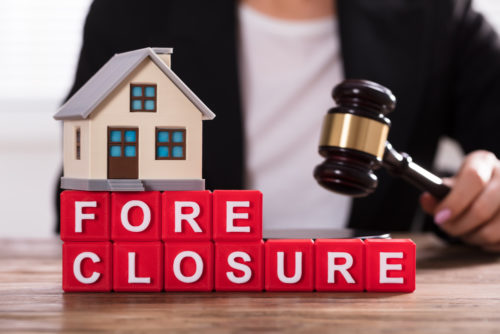Finding a foreclosed home or pre-foreclosed can be trickier than finding a regular home for sale. They may not be in the Multiple Listing Service (MLS) database, and even if they are, consumers usually don’t get direct access to the service. That does not mean foreclosed or pre-foreclosure homes are impossible to find without an agent; they just require a bit more legwork on your part.
Table of Contents
Use a Real Estate Agent
The most obvious way to find foreclosed homes, also known as real estate owned or “REO,” is to work with a real estate agent. They will have access to the MLS, and likely have some knowledge of local foreclosures. Working with an agent that specializes in foreclosures is best if you are specifically looking to buy a foreclosure. They will know the laws better, and may have a relationship with the banks, that could help you in the long run. They will also know the local market, which can help in comparing prices to regular house sales.
Real estate agents can also notify you quickly of any new foreclosures. This is important, as foreclosures in desirable areas can be snatched up quickly by consumers looking to get into a good area at a low price point. Speed is essential if you hope to make an offer.
Look for the Signs
Another tactic that is effective is driving around and looking for “For Sale” signs. The signs will state that the bank is a foreclosure. Other language used might be “bank-owned” or “bank repo.”
This can help you find unlisted foreclosed houses in a neighborhood you like. Once you’ve found a house for sale, you can call the agent on the sign and ask them about other foreclosures in the area.
Search Government Websites
Federal and local agencies that are involved in or provide foreclosure listings will provide public notice of any new listings. Visit each site, as they all work differently. Some of these are foreclosures, while others are seizures. All are, essentially, lender-owned.
- HUD, the U.S. Department of Housing and Urban Development
- Fannie Mae, through HomePath
- Freddie Mac, through HomeSteps
- U.S. Department of Treasury auctions
Courthouses
In many states, courts are involved in foreclosure auctions. Auctions can be held on the courthouse steps. This, however, is usually dominated by professionals, such as house flippers, rather than the average homebuyer. It can also be risky, as you are buying sight unseen, and the house could have liens, judgements, or late property taxes that you would then assume.
The courthouse will also contain a list of houses in pre-foreclosure, as part of public record. This may give you an upper hand, allowing you to put in an offer before the house goes to foreclosure and dealing with the owner before the bank takes the deed. This could result in a short sale.
Search on Bank Websites
Major banks often list the properties they own and are selling. Be sure to check with your local institutions, as well, as they might also have real estate portfolios. For example, both Bank of America and Wells Fargo offer listings to the public.
Consult an Asset Management Company or Online Foreclosure Service
Banks often leverage outside management companies to handle foreclosures, rather than doing it themselves. Chase, unlike Wells Fargo and B of A, does not provide listings, instead using 24 Asset Management and NRT REO Experts. There are also websites dedicated to foreclosure listings and management that are not associated with a specific lender, they are simply collecting listings.
Foreclosure Listing Services
Foreclosures aren’t always in the MLS, and can be a pain to track down yourself. Some companies specialize in compiling listings and will offer them to you for a fee. As you have probably figured out, it takes a good amount of effort to track down unlisted foreclosures. These database sites, such as RealtyTrac and Foreclosure.com, list foreclosures and pre-foreclosures, and allow you to make non-binding offers on the house through an agent or seller. You may also be able to search a simplified version of the site for free.
These can be handy if you don’t already have an agent. Otherwise, paying the monthly fee may be overkill.
Auction Houses
Auctions on foreclosure and pre-foreclosure properties are often handled by a separate auction house, which may offer listings and upcoming auctions you can review online. These deal in bulk, often selling upwards of 100 houses in a day.
Because it’s an auction, it can be a feeding frenzy of buyers, such as house flippers. It’s still possible to get a good deal, but chances are less than just trying to buy a foreclosure or pre-foreclosure.
Much like courthouse auctions, you may be buying sight-unseen. Since foreclosures are sold as-is, this could mean you are stuck with lots of repairs. It’s something to be aware of when going to the auction. These sales are also usually cash only.
Auction houses often list single auctions in the newspaper, but you can use this to find their websites to find upcoming mass auctions. You can also ask your real estate agent to look into auctions, as well.
Finding foreclosures and pre-foreclosures requires patience and legwork. However, the work can pay off in a great deal on a house, even if it might need repairs.
Image Source: https://depositphotos.com/





